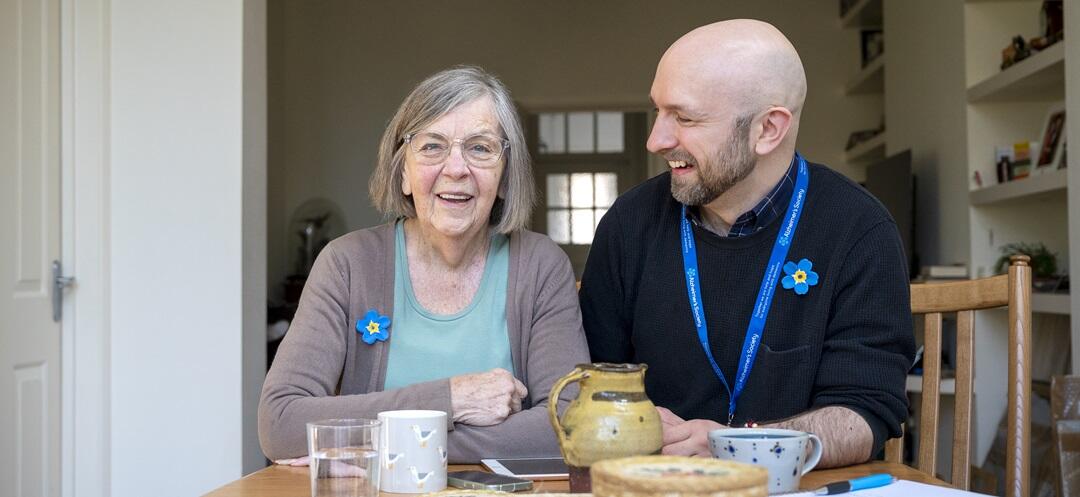What we think about dementia diagnosis
Find out more about our position on dementia diagnosis in England, Northern Ireland and Wales, and our focus on early and accurate diagnosis.
What we think
Getting a diagnosis can help people living with dementia to plan for the future and access care, support, treatments to manage symptoms, information, advice and opportunities to participate in dementia research.
According to our Personal Experiences of the Dementia Journey report:
Over 90% of people surveyed by Alzheimer's Society saw a benefit to getting a diagnosis. But right now, a third of people living with dementia in England and Northern Ireland, and nearly half of people living with dementia in Wales, don’t have a diagnosis.
This means they’re missing out on all the benefits a diagnosis can bring. Despite this, the equivalent of only 1.4% of total dementia healthcare spend goes on diagnosis and treatment.
This leaves people living with dementia and their families at risk of crises like unplanned hospitalisation. This can have an adverse effect on their health and wellbeing, as well as the wider health and social care system.
We need to see clear action
- Set bold, ambitious and achievable new diagnosis rate targets in England, Wales, and Northern Ireland. These targets should be supported by action to encourage people to seek a diagnosis, and support must also be provided to local systems to deliver on targets set.
- Improve diagnosis to ensure that in future, everyone living with dementia can access an early, accurate diagnosis if they want it, including information on the type of dementia they have. This must include investment in the workforce and tools needed to diagnose more people.
- Tackle the regional inequalities and postcode lottery in dementia diagnosis. We know that diagnosis rates vary significantly from place to place, with dementia prevalence also nearly twice as high for those living in the most deprived areas compared to the least deprived areas.
- Ensure the regular collection and publication of national diagnosis data, including information on dementia type, across all three nations. This already happens in England, but there’s a more limited range of national and local data published annually in Wales and Northern Ireland.
How is dementia diagnosed?
Read information on getting a dementia diagnosis, including what to expect from tests and scans.
Understanding dementia diagnosis rates in the UK
Dementia diagnosis rates across the UK are too low. Here are the latest estimates for dementia diagnosis rates across the three nations:
- England - 66.5% as of November 2025.
- Wales - 57.2% as of December 2025.
- Northern Ireland - 58.4% as of March 2025
In England, NHS England has a target that two-thirds (66.7%) of people living with dementia should have a diagnosis. In Wales, the target in the last Dementia Action Plan that health boards should raise diagnosis rates by 3% annually has also not been met. No targets are in place in Northern Ireland.

The difference a diagnosis makes
Raising diagnosis rates is vitally important because people living with dementia deserve the dignity of a diagnosis, as well as the care, support and treatment it can bring.
However, it’s also vital that people receive a good quality, early and accurate diagnosis, delivered with a confirmation of their dementia type. This means people can access the symptomatic treatments of today, and the disease-modifying treatments of tomorrow.
As and when disease-modifying treatments such as Lecanemab and Donanemab are approved for use on the NHS and HSC (Health and Social Care) system, they will only be available to people in the early stages of Alzheimer’s disease, because this is when the treatments are most effective.
We need to see investment in existing and new diagnostic techniques to improve the speed and accuracy of a diagnosis, including through better access to blood tests and brain scans.

The challenges around diagnosis
Our research has identified many barriers to diagnosis, including health workforce capacity, differences in how people are diagnosed across the UK, funding arrangements, public health messaging and regional variation in access to resources.
There is currently inequity of access to diagnosis services, including brain scans and other diagnostic technology. According to the National Audit of Dementia, the proportion of patients that received a scan as part of their assessment varies from 0-90% at service level, while just 2.1% of patients had a specialist investigation (e.g. a PET (Positron Emission Tomography) scan or CSF (cerebrospinal fluid) test) carried out.
Accessing care is also an issue for many people with dementia.
With the arrival of potential new disease-modifying treatments, and new diagnostic tools such as blood tests, it is vital that we can deliver the good quality, early and accurate diagnoses needed for people to take advantage of new treatments.
Read more about our position on getting ready for disease-modifying treatments.
Inadequate data negatively affects improvement efforts. There is no centrally collected data on diagnostic system capacity, waiting times from referral to diagnosis, and access to brain scans. Without proper data collection and publication, it is difficult to allocate resources according to need.
We also know that people do not get the post-diagnostic support they need. Unmet post-diagnostic support need increases the risk of adverse, costly and harmful outcomes such as hospitalisation, carers breaking down and faster admittance to care homes for people affected by dementia.
Typically, a person living with dementia will be diagnosed in a memory assessment service, being discharged back to their GP for ongoing care, support and treatment. This post-diagnostic support is usually defined as “holistic, integrated continuing care in the context of declining function and increasing needs of family carers.”
Our 2022 report Left to Cope Alone found that a lack of guidance around post-diagnostic support is leading to a “postcode lottery of access to effective care and support,” leading many people living with dementia and their families struggling to access the help they need.
The NICE guideline for dementia says that dementia specialists should be involved in ensuring appropriate access to post-diagnostic support and treatment, and we want to see this followed in practice.
What changes do we want to see around diagnosis?
We want to see changes at a national level in all three nations, and at a local level, around diagnosis.
We know researchers are working to bring new diagnostic techniques and future treatments to people with dementia. As part of our work, we’re encouraging our healthcare systems to be ready to deliver them.
They must invest in the infrastructure and workforce needed to diagnose more people early and accurately and enable access to disease modifying treatments (DMTs) for those eligible. When DMTs are approved, this must include support to ensure that services are able to monitor patients on these treatments regularly using brain scans.
- Bold, ambitious and achievable new diagnosis rate targets set by governments and health systems to ensure more people get the early and accurate diagnosis they deserve.
- Improvement in centrally collected data on diagnosis, with diagnosis rates and information on dementia type published regularly across the three nations.
- In England, the NHS Ten-Year Plan committed to the development of the first ever Modern Service Framework for Frailty and Dementia. This framework should:
- Set specific goals on improving access to an early and accurate diagnosis
- Commit to the development of a new NICE Guideline on Mild Cognitive Impairment (MCI) to provide clarity and guidance on MCI diagnosis and pathways.
- Deliver long-term investment in the diagnostic infrastructure and diagnostic workforce for dementia.
- In Northern Ireland, the Regional Dementia Care Pathway (a national plan) should be funded and fully implemented to improve diagnosis rates, waiting times and adult social care reform in Northern Ireland. We want to see dementia prioritised, pathways developed to ensure good links between services and support provided to move between them. We will use our membership of the Regional Dementia Project Board to push for these changes.
- In Wales, delivery of the commitment by Welsh Government to include a new and ambitious diagnosis rate target in the next National Dementia Action Plan. This should be supported by plans to increase access to an early and accurate diagnosis and implementation of post-diagnostic support.
- Local systems across the three nations to prioritise dementia, including through comprehensive dementia strategies. In England, these strategies should commit to having a local diagnostic rate of two-thirds (66.7%) or above.
- The innovative work already going on to improve access to an early and accurate dementia diagnosis (as covered in a recent report by the King’s Fund) must be understood, shared and replicated across local health care systems.
- The collection of data to better understand diagnosis pinch points including the collection of trust and board-level diagnosis waiting lists and patient waiting times from GP referral to diagnosis needs to be improved.



In England, diagnosis rates vary across systems from 77.0% in the South Yorkshire Integrated Care Board area to 56.1% in the Somerset Integrated Care Board area.
In Wales, Powys has the lowest diagnosis rate, at 48.5% compared to 65.1% in Cardiff and Vale University Health Board.
In Northern Ireland, there isn’t sufficient data available to enable a comparison of diagnosis rates at a local level. There’s also insufficient local data available in any of the three nations related to the diagnosis pathway, making it hard to quantify the scale of the postcode lottery people face in accessing quality diagnosis.
Our report: Improving access to a timely and accurate diagnosis of dementia in England, Wales and Northern Ireland
In 2022, we worked with key stakeholders from the three nations, including researchers, clinicians, people living with dementia and decision makers, to explore the barriers to diagnosis, and to build consensus on what needs to happen to improve access to an early and accurate diagnosis of dementia.
We continue to share these recommendations with health services and governments across the three nations, and they will inform policymaking and practice at both a national and local system level.